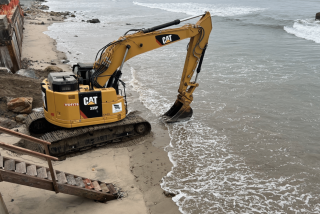2 Sue Huntington Beach for Change in Zoning : Courts: Would-be developers of coastal properties say move to protect wetlands has made their holdings worthless. City officials, however, deny it is unconstitutional.
HUNTINGTON BEACH — Two would-be developers with interests in several large properties near the ocean have sued the city, claiming that recent zoning changes designed to preserve coastal wetlands have made their holdings worthless.
“What it amounts to is an attempt by the city to confiscate our property for public benefit without compensation,” said Robert London Moore Jr., president of the Mills Land and Water Co. His company owns 23 undeveloped acres near Pacific Coast Highway and holds options on another 28 acres just south of Beach Boulevard.
“We see the city as holding our valuable coastal land as hostage in an environmental controversy that has been going on for years,” said Moore, whose company hopes to develop shops and a possible restaurant on the land.
The company’s lawsuit, filed Friday in Orange County Superior Court, was joined earlier this week by another suit by the estate of Daisy Piccirelli, which has a financial interest in about 45 acres near Pacific Coast Highway and Brookhurst Street.
Both suits ask that the zoning change--dubbed a “coastal conservation suffix” and most recently amended Sept. 6--be set aside as an unconstitutional violation of property rights and that the city be prohibited from enforcing it.
City officials deny that the zoning change is unconstitutional or violates anyone’s rights.
According to Huntington Beach senior planner Scott Hess, the controversy stems from efforts by the city beginning in the early 1980s to cooperate with the California Coastal Commission, whose goal is to protect 232 acres of prime coastal real estate stretching along Pacific Coast Highway from Beach Boulevard to the Santa Ana River.
In 1982, Hess said, a study conducted by the California Department of Fish and Game determined that some of that land contained viable wetland areas. To protect those wetlands, he said, the City Council subsequently adopted the coastal conservation zoning that superseded existing industrial and residential zoning.
Under the new zoning, Hess said, landowners are barred from using their properties for anything but such ocean-dependent industrial activities as aquaculture or power generation, habitat restoration, nature study trails and, in some cases, light mineral extraction.
Before using the land for anything else, he said, an owner must demonstrate that the use would not affect wetlands or, if it did, agree to provide some sort of environmental mitigation. “He always has that option,” Hess said, referring to Moore’s company.
In his lawsuit, however, Moore argues that the zoning regulation “effectively negates all of the economically viable uses of the property,” thus forcing the company to “bear the entire burden of preserving wetlands and open space on behalf of the public without payment.” He also describes the land in question as a “wasteland,” devoid of viable wetlands for 50 years or so.
More to Read
Sign up for Essential California
The most important California stories and recommendations in your inbox every morning.
You may occasionally receive promotional content from the Los Angeles Times.










